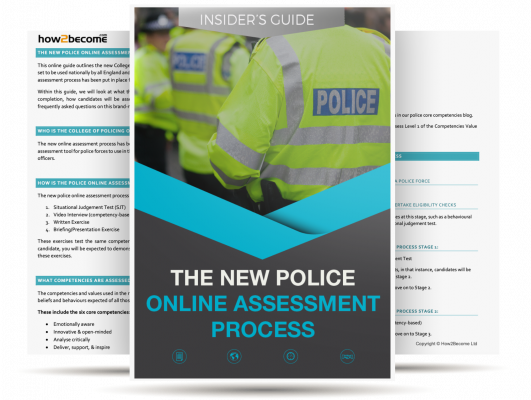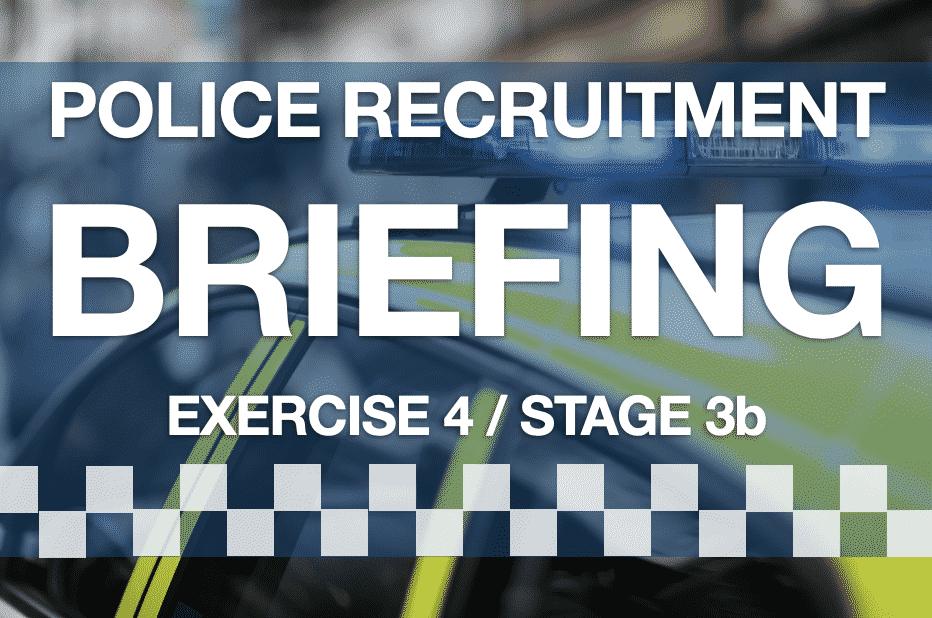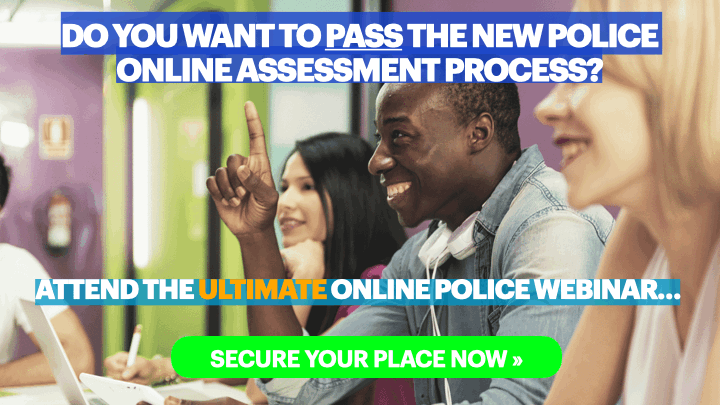WHAT IS THE BRIEFING EXERCISE? (EXERCISE 4/STAGE 3b)?
The briefing exercise is part 4 (also known as Stage 3b) of the new police Online Assessment Process. The briefing exercise requires you to handle a scenario and related problems, in the role of a police constable, which will be presented in the form of a series of questions.
For this exercise, the scenario will be read out, and displayed on your screen. The scenario is broken down into three parts. You will only see one part at a time. After you are shown part one, you will then be shown a series of four questions, again, one question at a time. After each question is shown, you have one minute to prepare your answer for it, and then 3 minutes to answer it.
You are required to say your answers aloud, as if you were talking directly to your sergeant, explaining your thought process behind your answer. Remember, this exercise is virtual, so no one else will be watching you live, but rather, your answer will be recorded via your webcam and microphone. An assessor will watch your recorded answers at a later date. All of the recorded is done via the assessment platform, and is timed, so you cannot rerecord your answers.
Download the new police Online Assessment Process guide for FREE! Simply enter your name and email below:

HOW THE TEST IS ASSESSED?
Candidates’ will be assessed against the following competencies and values during the written exercise:
Values:
- Public service
Competencies:
- Emotionally aware
- Innovative & open-minded
- Taking ownership
It is essential that you only use the information provided and that you do not make any new information up in your report.
An assessor will review and score your written exercise after you have completed this assessment.
Remember, you are undertaking the role of a PC, so you will be expected to answer the questions as if you are a PC with general knowledge on how the police are expected to build positive relationships and community relationships (see the competencies assessed). No technical knowledge of policing will be required.
It is important you show your understanding of the role of a PC as well as the core competencies and values that you are being assessed on.
You are not allowed to use any external resources to aid your preparation – such as the core competencies and values printed out next to you.
TIMING BREAKDOWN:
The briefing exercise is split into three parts and you will roughly have 60 minutes in total to complete the entire exercise. The time varies per candidate as there are preparation videos and set up which is not timed.
Once the preparation stage is complete, the timings of the exercise are allocated as follows:
Read the materials provided and plan your response. This is not assessed. 10 minutes
Part 1 – present your answers to the question asked. 12 minutes
(1 minute to prepare your answer to the question, and 3 minutes to answer it. There are 4 questions in Part 1)
Part 2 – new information is provided and additional respective questions asked. 12 minutes
(1 minute to prepare your answer to the question, and 3 minutes to answer it. There are 4 questions in Part 2)
Part 3 – new information is provided and additional respective questions asked. 12 minutes
(1 minute to prepare your answer to the question, and 3 minutes to answer it. There are 4 questions in Part 3)
TOP TIP: Although GRAMMAR, SPELLING, AND PUNCTUATION is NOT assessed, it is important that we focus on accuracy when writing our written report. If it’s between you and a candidate that has scored the same but they have no errors in their report, it’s likely it will be the other candidate that gets hired. Let’s now start working through an example police officer written test exercise to help you. This is going to take a little bit of time. But I want to show you my thought process, how I would tackle a particular question. Let’s take a look at an example exercise.

TOP TIPS FOR YOUR BRIEFING EXERCISE:
Think About The Implications Of Your Decisions
When you go into the briefing exercise, you will need to give a clear rationale for every single decision that you’ve made.
Consider The Structure Of Your Response
It’s imperative that you can properly structure your response, as this will help to make your ideas clear to the assessor. The clearer your response, the better you will score, and the more logical your ideas will come across.
Competencies & Values
As always, the competencies and values will play a vital role in how you are scored for this exercise. Factor the competencies into your responses – call them by name e.g. it’s important that our officers are open-minded when dealing with members of the public, as in this situation it will allow for…. The better you can do this, the higher marks you will get.
Test Your Setup Before Taking The Assessment
You will need either a desktop computer, laptop, or tablet with a good internet connection. Test your internet connection, microphone and webcam before you take this test. Ensure that you have a good internet connection and that your voice can clearly be heard through your microphone. Although you aren’t being assessed on your visible appearance, this is a formal assessment and you should ensure that you are dressed smart, in a well-lit room, and that you and the background look professional. BONUS: Make sure your webcam is level with your head height so that you aren’t looking down into the camera and that a window isn’t behind you as this may cause the front of you to be in shadow.
Plan For Further Information And Questions
You can’t predict exactly what the exercise is going to ask you, but it’s always good to have a think about what types of questions you’ll be asked. This will ensure that you aren’t caught off guard by anything, and can give clear and direct responses. BONUS: Get plenty of example practice questions and answers for this exercise at: www.How2Become.com
BRIEFING EXERCISE EXAMPLE QUESTION:
Part 1 (12 Minutes)
Since the closure of the recreational ground, many of the younger local residents have been roaming the streets into the late evening which has seen a worrying increase in the number of reports of residents of the Lionhare estate being threatened or intimidated. In March, 16 incidents were reported, this increased by 50% in April and a further 25% in May. The reports have involved a mixture of people being followed back to their houses and being confronted in enclosed areas with demands for them to hand over their phones and wallets.
- Highlight the main issues that the community are facing.
- What are your recommendations for addressing the issues?
- What can be done to reassure the community?
- Highlight the responsibilities that you and those policing these issues have.
- What are the risks to those policing the front line in implementing these actions?
Example Briefing Question Part 1 Answer
In your responses for questions 1-5 points you could have covered:
- A summary of the situation including that Lionhare residents are being threatened or intimidated by youths, what incidents have been reported, and the increased rate of incidents that were reported per month.
- It’s important to identify that since the recreational ground has closed, the incident rate has increased.
- You can reassure the community by holding a meeting, perhaps with the neighbourhood watch and the local secondary schools.
- You could reference the parts of the competencies such as taking ownership – the police are responsible for ensuring public safety and you will ensure that you will engage with the community to make them feel safe. You can suggest speaking with the members of the community impacted directly to find out their thoughts on the issue and to work with them.
- You could suggest an increase in police presence during times residents have reported incidents.
- Safety is important for both the public and those serving in the police, including yourself, so it is important to mention this and how you will address it. For example, police patrolling the areas should not patrol alone.
Part 2 (12 Minutes)
A teenager from the local secondary school has been assaulted during an unprovoked attack after refusing to hand over his belongings to a group of youths.
- Does this new information change your initial thoughts and recommendations?
- What’s your next step in light of this new information?
- How can you work with the secondary school to tackle the increase in crime?
- How can you involve the community?
- What are the possible consequences of your proposed actions for the community?
Example Briefing Question Part 2 Answer
In your responses for questions 6-10 points you could have covered:
- Be honest here with how the new information can change your views. Being open to change is important. For example, you may now have realised how it is important that not all youths are to be victimised as causing issues, and providing support for the community includes the youths also.
- How the situation has now escalated with violence and the impact this could have on the community – increased levels of fear and the risk of retaliation.
- This exercise assesses the competency, being emotionally aware, which you can address by mentioning that the youths committing these offences are part of the community too and therefore speaking with local schools about educating the youths on crime and its impact on others, or mentioning that facilities closing like the recreational ground could be having a negative impact on youth and that providing alternatives to the recreational ground could be good points to cover here.
- Consider the consequences of your suggestions. Will the community feel like their children are being victimised by your suggestions? Do your suggestions put anyone at risk? Will it cost the community financially? Will there be certain groups in the community impacted more than others?
Part 3 (12 Minutes)
Simon Doherty, a 16-year-old from the same school as the victim of the unprovoked attack, recently attended a meeting at the station and informed the constable on duty that an external gang, not from the local area, have been recruiting new members outside his school and he has overheard them talking about initiation rituals.
- Highlight the main issues that arise from this new information.
- Does this information change your previous plan?
- What is your next step in relation to contacting the school?
- What concerns will this raise within the community?
- What is the consequence of the community feeling unsafe?
Example Briefing Question Part 3 Answer
In your responses for questions 11-15 points you could have covered:
- You now know that other youths have been targeted and the age of the victim as well as the time the incident took place after school. You also can address that a gang has been using the outside of a school for recruiting.
- This new information likely changes some of your previous suggestions as the gang have been identified as not a local gang. Address this in your answer.
- You could suggest a police presence outside of the school and further reassure the community by saying your police service will work with the neighbouring police force where the gang originate.
- It could be a good idea to contact the school and inform them of the gang activity outside their gates so that the school can put the correct safeguarding measures in place and educate their pupils. Also, ask the schools if they were aware of this taking place?
- A potential consequence of the community feeling unsafe would be them not sending their children to school, for parents to potentially confront the gangs outside of the school, or for teachers to feel unsafe to go to work. These areas should be addressed along with how you can reassure the community.
FINAL TIPS:
This exercise will really test you on your ability to adapt to changing circumstances. The new information you receive may complement your previous responses or it could completely change the situation. As always you are being assessed against the values and core competencies during your answers, so these should be at the forefront of each of your answers.
Remember, when answering the previous questions, you will be assessed on 3 competencies and one value: public service (value), and emotionally aware, innovative & open-minded, taking ownership (competencies).
As much as possible, try to naturally address these competencies and value in your answers, either directly or indirectly. Please note that the above suggested list is not comprehensive. You should study the role of a police constable and the core competencies and values to aid your own answers.
For further insider insight, detailed exam-style practice questions, and score boosting strategies specifically for the new online assessment process view our updated police officer tests workbook.


Are you allowed a pen and paper for this exercise so that you can write down notes?
Hi Gursimran, that’s a great question! According to the College of Policing you can take notes during the Written Exercise and Briefing Exercise.
Hi!
I just did my briefing stage and during my 10 minutes of video recorded preparation, my internet crashed. I had to reload the browser but I was taken back to the start. Would the old first 10 minutes still be looked at?
Thank you in advance
Rammy
Hi Rammy, thanks for the comment. I am sorry to hear your browser crashed! I think it is unlikely that it would have kept your previous recording, but I cannot say for sure. I would certainly do it again as if you hadn’t answered it before if it has taken you back to the start. I recommend closing any other tabs you have open and any other applications on your device to minimise the chances of it crashing again. Best of luck! Let us know how you get on 😊
Hi Joshua, this information is extremely informative. I really appreciate your recommendations. Do you have any examples for the competency based questions. Many thanks
Hi Tina, we certainly do! Please check out our free resource here: https://www.how2become.com/product/police-online-assessment-centre-competency-based-interview-download/